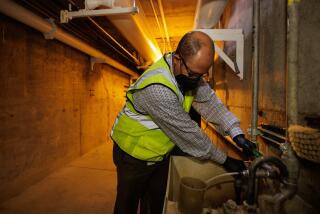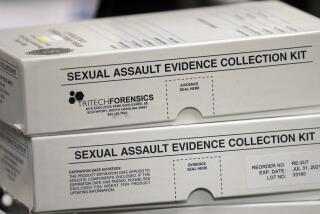Maddy Suggests Trial AIDS Tests of New Prison Inmates
- Share via
SACRAMENTO — Senate Republican Leader Ken Maddy said Wednesday he is pressing the Deukmejian Administration to immediately conduct a two-week experiment of testing all new state prison inmates for AIDS.
The newly installed GOP leader said the project would help the Legislature and Administration learn the extent of the AIDS problem in prisons and determine if more space is needed to isolate infected convicts.
At a breakfast with The Times’ Sacramento bureau, Maddy said he thinks the public believes that “we should be doing more than we are doing” to deal with the AIDS epidemic and that, politically, the fatal disease “may be the biggest issue in the country.”
“What I want to do is to test everyone that came into state prison for the next two weeks for AIDS,” he said, adding that the inmates’ names would be kept confidential.
Maddy said if the results showed that 2% were infected with the disease, they probably could be segregated with little disruption to the system. But he added, “If, in fact, it happens to be 20% or 30%, where are we going to put them? I want to have an early sampling to find out the extent of our problem.”
The Fresno legislator suggested that if acquired immune deficiency syndrome is found to be widespread in state penal institutions, that fact probably would intensify pressure to build a long-stalled prison in Los Angeles County and provide extra capacity for AIDS patients in other facilities.
Maddy stopped short, however, of suggesting that the Los Angeles prison, which has been tangled in a dispute between Senate Democrats and Gov. George Deukmejian, be set aside for AIDS inmates if the deadly illness is found to be rampant in prisons.
Currently, 83 prisoners who have AIDS, suffer from AIDS-related ailments or who have tested positive for exposure to the AIDS virus are segregated from other inmates at the California Medical Facility at Vacaville.
Pat Kenady, the Administration’s point man on the Los Angeles prison, noted that the Administration on Tuesday came out in favor of mandatory testing of all new prisoners for exposure to AIDS. He termed the proposal superior to Maddy’s.
“I think the Administration figures it is more logical to go into this broader testing to provide a more valid and reliable sample,” Kenady said.
The Administration plan, which would be contained in a bill by Sen. John Doolittle (R-Citrus Heights), the Senate’s leading proponent of anti-AIDS legislation, would require the 30,000 new prisoners admitted each year to undergo testing. Additionally, prison officials could require any inmate already locked up to submit to testing.
Kenady said the Administration did not recommend testing the entire prison population for AIDS because it wants to “gather the data to make a judgment on what the incidence was and whether to continue or expand (testing).”
He said one option, depending on what the testing disclosed, would be to house AIDS patients and those with AIDS-related ailments at a medical facility such as Vacaville, while those who test positive for the disease but show no symptoms could be segregated in a separate wing of the institution in which they are incarcerated.
“These are issues that are going to have to be addressed in the long term if the rate goes up and we don’t have testing,” Kenady said.
Maddy, who indicated he talked to Deukmejian about his proposal, said he wants “to do the sample testing to give some idea of what we have ahead of us before we jump out there and pass a law.”
Center of Controversy
At the same time, he noted that controversy swirls around the civil liberties issue of segregating AIDS prisoners, a matter of major importance to AIDS patients. “I think a court would rule in terms of health and safety that you could isolate,” he said.
The GOP leader, usually regarded as a philosophical moderate, suggested that huge sums of money may be needed for additional AIDS research and said the voters may favor exempting such expenditures from a 1979 constitutional limit on state spending. (The spending initiative was sponsored by Paul Gann, the anti-tax crusader who now is suffering from AIDS.)
“If AIDS continues to be the epidemic that we think it will be, it is clear to me that we are going to have to spend vast sums of money,” Maddy said. “That may be an issue we can go to the public for and say, ‘This is something that has to be outside (the limit), this extraordinary money has to be spent.’ ”
Similar exemptions from the spending limit have been proposed in recent months for such purposes as highway construction and public education.
More to Read
Get the L.A. Times Politics newsletter
Deeply reported insights into legislation, politics and policy from Sacramento, Washington and beyond. In your inbox twice per week.
You may occasionally receive promotional content from the Los Angeles Times.










